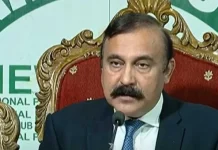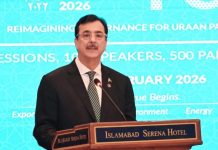ISLAMABAD: Finance Minister Muhammad Aurangzeb, in his debut budget 2024-25 speech on the floor of the National Assembly, only confirmed that a long-term loan deal with the International Monetary Fund (IMF) to bail out Pakistan’s economy outweighs the relief direly needed by the inflation-broken masses, whose incomes have hit rock-bottom in recent years. Torn between fears of losing popularity, ensuring economic stability, and riding out sticky slugflation, the Pakistan Muslim League-Nawaz (PML-N)-led coalition government seems to be on its knees before the IMF to get the next bailout going. This year’s budget, much like the previous one, is generally viewed as being micro-tailored to meet the IMF requirements to secure the bailout. Aurangzeb, a first-time finance minister, unveiled the budget in the National Assembly amid a noisy protest by the opposition lawmakers belonging to Pakistan Tehreek-e-Insaf (PTI)-backed Sunni Ittehad Council — who stood on their desks, raised anti-government slogans and tore the copies of the Finance Bill 2025. The opposition members chanted, “go Nawaz go” during the session. “Despite the financial and political challenges during the past one year, the government’s progress on the economic front has been impressive,” the finance minister said in his opening remarks. “We have heard the talk of all political parties to sit together in the country’s interest several times. Today, the nature has provided Pakistan with another chance to walk on the path of economic progress and we can’t afford to waste this opportunity,” he said while requesting all the MNAs to cooperate with the government putting the country on the path of progress. “A while ago, Pakistan’s economy faced a difficult situation as the State Bank’s reserves were enough for only less than two weeks of imports.The value of the rupee depreciated by 40%, economic progress was almost nil, and inflation had reached a level that the people were going below the poverty line at a fast pace. Coming out of this situation seemed difficult,” said the minister. He also praised the previous government for striking a short-term standby agreement with the IMF, which he said paved the way for economic stability and ended uncertainty “at a point when the previous IMF programme was about to end and reaching agreement on new [IMF] programme was uncertain”.The finance minister said the GDP growth rate is expected to remain 3.6%, in the next fiscal year while the inflation is expected to come down to 12%.He said the budget deficit is 6.9% of the GDP and the primary surplus to remain at 1% of the GDP. The tax collection by the Federal Board of Revenue (FBR) is estimated at Rs12,970 billion which is 38% more than the current fiscal year. Therefore, the province’s share in the federal tax collection will be Rs7,438 billion. The federal government has set a non-revenue target at Rs3,587 billion, while the Centre’s net income is Rs9,119 billion, the finance minister said adding that total federal expenditures have been estimated at Rs18,877 billion of Rs9775 billion will be spent on interest payments.






















